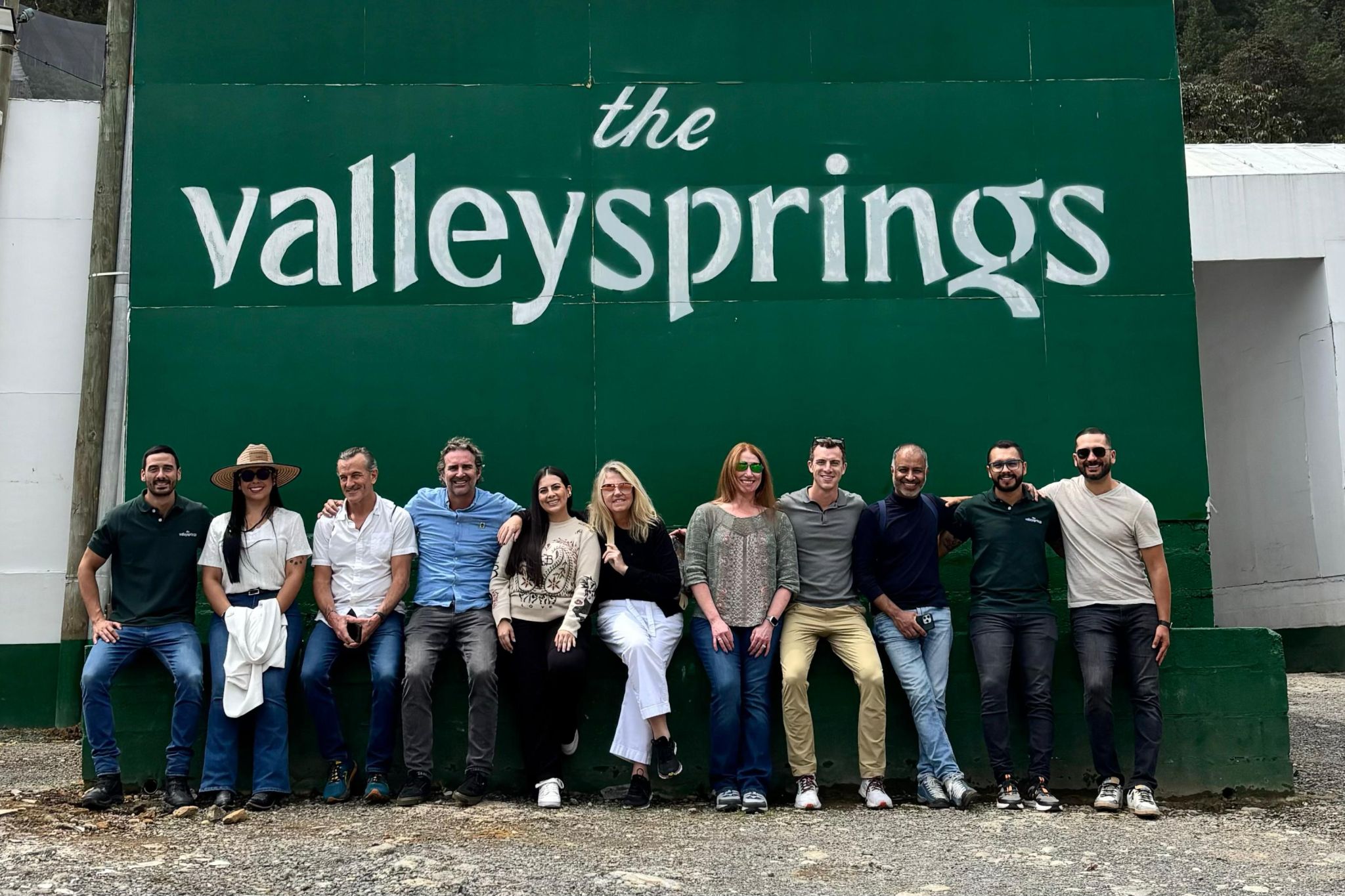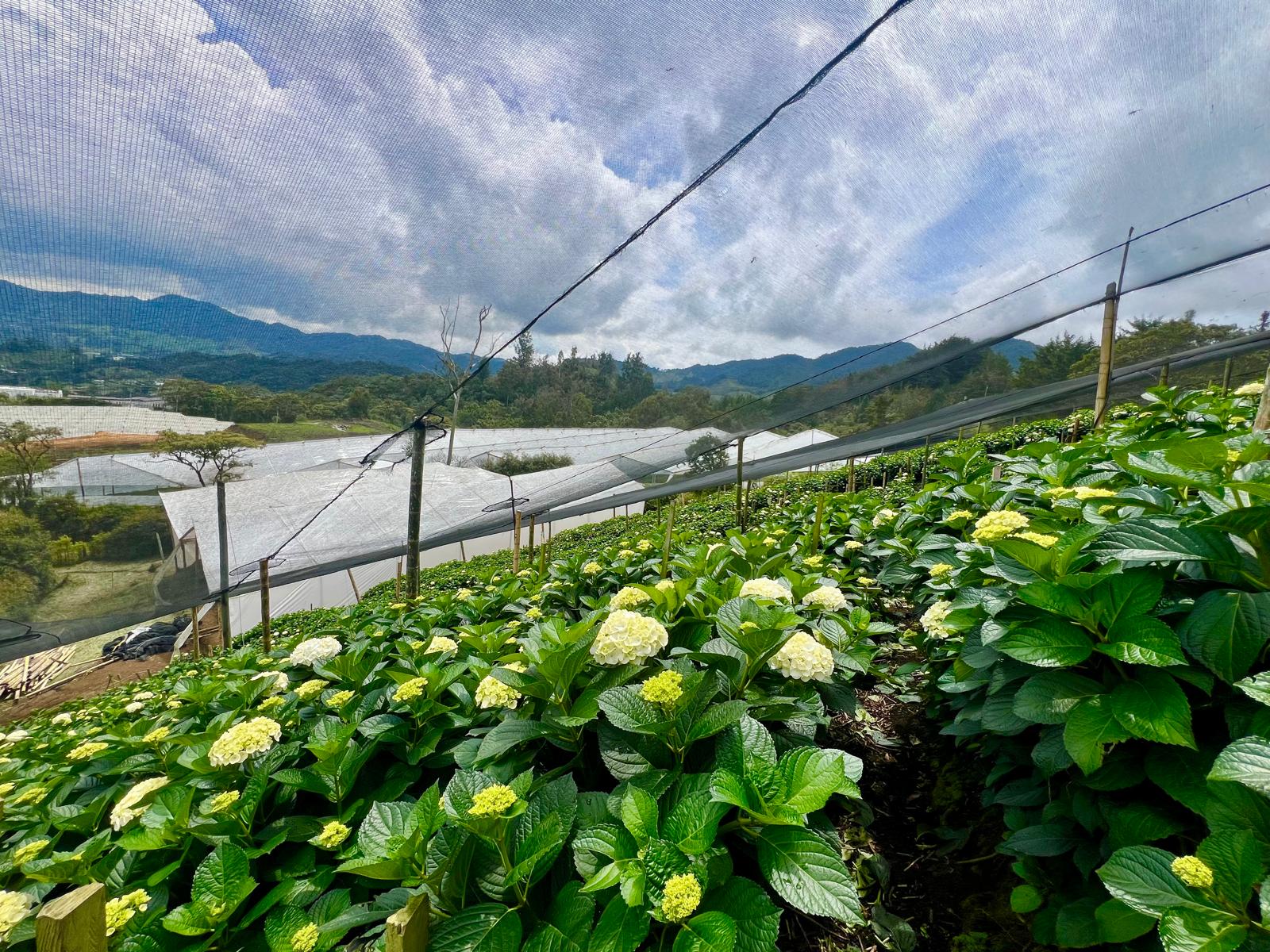
Pictured: the Fair Trade USA™ Leadership Team at the Valley Springs farm in Colombia, a Fair Trade flower farm
Cut flowers are a classic symbol of joy and warmth—they brighten up our living spaces, serve as thoughtful gifts to loved ones, and make life more colorful. But, behind every bouquet are the real people who are responsible for growing, cutting, dyeing, packaging, and distributing cut flowers. Last year, the Fair Trade USA Leadership Team headed to Colombia, one of the world’s top floral exporters, to meet flower farmers, hear about life on Fair Trade Certified flower farms, and learn how Fair Trade flowers are making a difference in the industry.
The global cut flower industry is hugely profitable, valued at 21.82 billion USD in 2024, and expected to grow significantly over the next 10 years. Flowers are water intensive, and farms tend to be located in high-biodiversity areas where pollution threatens local ecosystems. Yet flower farmers around the globe, often women, rarely receive a living wage. In Kenya and Ethiopia, workers are paid ~50%-60% of the living wage, which is not enough to cover even basic needs. Working conditions on farms are also problematic. Farmers often work excessive overtime during peak seasons, and a lack of protective gear poses health risks. There are also environmental concerns. Colombia is the second top exporter in the global flower trade—and hydrangeas are a top export
“At the Fair Trade Certified flower farms, we saw and heard firsthand how certification creates more equitable and stable working conditions. Many of the workers, particularly women who are heads of households, benefit from fair wages, better working environments, and access to Fair Trade premiums that fund essential community projects – most recently for initiatives to support nutrition programs, directly improving the quality of life for workers and their families. Fair Trade Certification provides these strong, courageous women with the economic stability to support their families, access childcare, and invest in their futures with more security.” – Meagan Siddiqui, Head of Digital Technology



Pictured: the Valley Springs hydrangea farm
📍Medellin, Colombia
Our leadership team travelled to Medellin, Colombia, where they visited the Valley Springs hydrangea farm, which is Fair Trade Certified. One of the team’s key learnings is how integral women are to the floral farming industry. The majority of workers at the Valley Springs farm are women. The team shared that women have a softer touch with delicate stems, and an incredible eye for detail when it comes to floral arrangement. Dana Dufresne, our Chief Growth Officer, had the opportunity to sit down with women on the farm and connect on their experiences as mothers and leaders in their work. She learned that the majority of women on the farm are heads of their household, meaning that they are generating the majority of income for their families while also working full-time.
“The level of happiness and pride that they have for their nursery was overwhelming, and working on a Fair Trade Certified farm empowers a high level of pride—they know that people are looking up to their farm and that they are setting high market standards.” – Dana Dufresne, Chief Growth Officer
The Fair Trade Flower Difference
On Fair Trade Certified flower farms, workers receive fair wages, adequate time off, safe working conditions, and democratic participation in decision making on how Community Development Funds are invested. They also benefit from the environmental protections required in Fair Trade standards. On non-certified farms, it can be much more difficult for workers to earn a decent wage, and for caretakers, most often women, to raise their families due to long work hours and difficult working conditions.
Fair Trade Certification also provides premiums for workers to use for community projects of their choosing. There is plenty of buzz at the Valley Springs farm on where to spend these dollars, and our team sat down with workers to discuss where the funds could have the most impact. Currently, the workers use their premium on food vouchers for back-to-school season, and have plans to purchase school uniforms for their children. They are also looking to open a shop selling tortillas or other products, and reinvest the profits back into the community. There is a strong entrepreneurial spirit on the farm, and workers are excited about opportunities for growth.

Pictured (from left): Meagan Siddiqui, Dana Dufresne, and Ben Conard of Fair Trade USA

“I remember that they had such great pride in creating their Fair Trade committee, we brainstormed on ideas to create sustainable income to be invested back into the community. I still remember exactly what all of their faces look like, it was a very moving moment for me.” – Dana Dufresne, Chief Growth Officer
“Having the opportunity to visit with these incredible workers transforms the day-to-day work we do behind our screens on the systems we build into human-centered impact. Being on the ground allows team members to truly understand the challenges and successes of the producers we support—seeing what they see, feeling what they feel firsthand. This experience fosters a sense of responsibility and deepens our commitment to improving and scaling the Fair Trade Certified model.” – Meagan Siddiqui, Head of Digital Technology
Community is a core value at Fair Trade USA—and getting our team out into the field to get to know the people at the heart of our mission is essential. Whether it’s Fair Trade Certified flowers, fish, chocolate, or tea, a deep connection to our work and amongst our team means that we can continue to evolve our mission and support better working conditions and support for our planet around the globe.
“You realize that you’re just one person trying to make change, and as a leadership team it brings you together to really focus on what we’re here for, which is the mission.” – Dana Dufresne, Chief Growth Officer